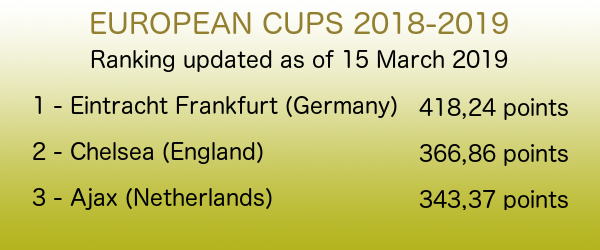
La versione italiana di questo post si trova qui
To calculate the ranking system of the European clubs that participate in the UEFA Cups (Champions League and Europa League) I will use the same system I used last season, with some changes:
- the clubs and national coefficients will be calculated on a 5-year basis (instead of 3-year);
- the 5-year club coefficient will be calculated on a corrected score, which doesn't allow negative values (see also "Adjustment to eliminate negative score");
- the Round Score of qualifying rounds, playoffs and Round of 32, if positive, will be halved.
Otherwise, the full explanation follows.
This system takes into account points made, goals scored, goals conceded and the strenght of the opponent team.
Base Score
For every match, I use this formula to determine the Base Score of each team: points made + (goals for - goals against) / 2,5
Examples
If a team wins a match 3-0, its Base Score is 3 + (3 - 0) / 2,5 = 4,2;
If it draws 0-0, its Base Score is 1 + (0 - 0) / 2,5 = 1 (the Base Score for a tie is always 1);
If it loses 1-2, the Base Score is 0 + (1 - 2) / 2,5 = -0,4.
Match Coefficient
Each team has a Club Quinquennial Score (CQS), which is determined by the results of the team in the previous five years. It is the strength of that team in UEFA Competitions (see "Calculate the CQS" for the details).
The Match Coefficient (MC) for a team is calculated dividing its opponent's CQS by its own CQS.
Example
For the 2015-2016 season, the CQS of Barcelona is 72,63 and the CQS of Arsenal is 53,17. If there will be a match between these two teams, the MC for Barcelona will be 0,732 and the MC for Arsenal will be 1,366. This means that it should be easier for Barcelona to defeat Arsenal, than for Arsenal to defeat Barcelona.
If one or both teams didn't play the European Cups in the previous five years, they have a CQS of zero. In this case, the Match Coefficient for a team is calculated dividing its opponent's National Quinquennial Score (NQS) by its own NQS.
The National Quinquennial Score is calculated, for every football association, taking into consideration the results of that association's teams in the previous five seasons (see "Calculate the NQS" for the details).
Example
For the 2015-2016 season, the CQS of West Ham United is zero (they didn't play European Cups in the last five years), and the CQS of Juventus is 58,76. If there is a match between these two teams, the Match Coefficient cannot be calculated with CQS, so the NQS of England and the NQS of Italy will be used (39,201 and 41,491, respectively). Then, the MC for West Ham United will be 1,058 and the MC for Juventus will be 0,945.
Round Score
If the Base Score is positive, it is multiplied by the Match Coefficient.
Otherwise, the Base Score is divided by the Match Coefficient.
The sum of the two legs' scores is the Round Score (RS).
The Round Score of qualifying rounds, playoffs and Round of 32, if positive, is halved.
The total score of a team is the sum of all its Round Scores, multiplied by 10.
Example
If Barcelona-Arsenal ends 3-0 (1st leg) and 1-1 (2nd leg), the RS for both teams are:
Barcelona: BS * MC = (4 + (4 - 1) / 2,5) * 0,732 = 5,2 * 0,732 = 3,81
Arsenal: BS * MC = (1 + (1 - 4) / 2,5) / 1,366 = -0,2 / 1,366 = -0,15
Bonuses
Starting from the Round of 16, for each round successfully passed, each team gains 10 points (if in Champions League) or 5 points (if in Europa League). So, for example, the winners of the Champions League and Europa League will have a total bonus of 40 and 20 points, respectively.
Furthermore, only for the Champions League, starting from the Round of 16, if the RS of a team is positive, it is multiplied by 2.
Adjustment to eliminate negative score
After the scores for all the teams have been calculated, they are adjusted to ensure that none of them is negative.
The best score remains unchanged, while the worst is converted to 1, and all the other scores are adjusted proportionally. In this way, the worst teams gain more points in the ranking, while the best teams gain few points (the first team gains no points).
In any case, the positions in the ranking don't change.
The formula to make this adjustment is TS + ((1-WS)/(BS-WS))*(BS-TS).
(TS = team score, BS = best score, WS = worst score)
Recap
- The total score of a team is the sum of all its Round Scores multiplied by 10, plus Bonuses and final adjustment.
- Each Round Score is given by the sum of the scores of the two legs of a round (or by the score of the only leg, if just one is played).
- The score of each leg is given by the Base Score multiplied (or divided) by the Match Coefficient.
- The Match Coefficient is calculated using the Club Quinquennial Score or, if not applicable, using the National Quinquennial Score.
- The Base Score is calculated with the formula: points made + (goals for - goals against) / 2,5
Calculate the CQS
The Club Quinquennial Score is set for each team calculating the average of the team's scores for the last five seasons.
If the team participated:
- in two seasons out of the last five, the average score is multiplied by 1,05;
- in three seasons, the average score is multiplied by 1,10.
- in four seasons, the average score is multiplied by 1,15.
- in all the last five seasons, the average score is multiplied by 1,20.
So, every team has its "modified average" for the last five years.
Then, the average of all teams' modified averages is subtracted by each team's modified average, and the result is divided by 1,25.
This new score is then subtracted from the team's modified average, and the result is divided by 2.
Example
Ajax got these scores for the last five seasons:
2010-2011: 227,12 points
2011-2012: 164,38
2012-2013: 74,84
2013-2014: 93,54
2014-2015: 210,85
The average is 154,15; it is multiplied by 1,2 because Ajax played the International Cups in all the last five seasons. So, the modified average is 184,98.
If we calculate in this way the modified average for all the teams that played at least one international match in the last five seasons, we find that the average of these scores is 69,38.
Then, for Ajax, 69,38 is subtracted from 184,98 and the result is divided by 1,25. The new outcome is 92,48.
This score is then subtracted from 184,98. The result is 92,5.
Finally, we divide by 2. The result is 46,25.
The CQS for Ajax in 2015-2016 season will be 46,25.
The whole calculation, in one formula, is:
((227,12+164,38+74,84+93,54+210,85)/5*1,2-((227,12+164,38+74,84+93,54+210,85)/5*1,2- 69,38)/1,25)/2
Calculate the NQS
The National Quinquennial Score is the average of the CQS of all the teams being part of a specific football association.
Example
England has 15 teams that played at least one international match in the last five seasons: the best is Chelsea with 57,10 points, and the worst is Aston Villa with 28,71 points. The average of the CQS of the 15 teams is 39,201.
The NQS for England in 2015-2016 season is 39,201.




Nessun commento:
Posta un commento